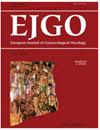Relationship between nutritional status and health-related quality of life in patients receiving chemotherapy after radical ovarian cancer surgery: a cross-sectional study
IF 0.5
4区 医学
Q4 OBSTETRICS & GYNECOLOGY
引用次数: 1
Abstract
Objective : To investigate the nutritional status and health-related quality of life (HRQoL) of postoperative chemotherapy patients with ovarian cancer and to discuss the relationship between these patients’ nutritional status and HRQoL. Methods : 201 postoperative chemotherapy patients with ovarian cancer were enrolled. All of them were assessed with a general information questionnaire, the Patient Generated-Subjective Global Assessment (PG-SGA), and the European Organization for Research and Treatment of Cancer Quality of Life Questionnaire-C30 (EORTC QLQ-C30). We compared the nutritional status and HRQoL among patients with different demographics and disease characteristics, as well as analyzed the correlations between nutritional status and HRQoL. Results : The mean quantitative evaluation of PG-SGA in patients receiving postoperative chemotherapy for ovarian cancer was 7.82 ± 4.58. Almost all of the study subjects in this investigation were moderately or severely malnourished and required nutritional support. We established a multivariate linear regression equation and found that the total PG-SGA score is an important predictor of HRQoL in postoperative chemotherapy patients with ovarian cancer. Conclusions : Medical staff can improve the HRQoL of this patient population by improving their nutritional status, thereby enhancing their clinical outcome.癌症根治术后化疗患者营养状况与健康相关生活质量的关系:一项横断面研究
目的:了解癌症术后化疗患者的营养状况及健康相关生活质量(HRQoL),探讨其营养状况与HRQoL的关系。方法:对201例癌症术后化疗患者进行临床观察。所有这些都通过一般信息问卷、患者生成主观总体评估(PG-SGA)和欧洲癌症研究与治疗组织生活质量问卷-30(EORTC QLQ-C30)进行评估。我们比较了不同人口统计学和疾病特征患者的营养状况和HRQoL,并分析了营养状况与HRQoL之间的相关性。结果:PG-SGA对癌症术后化疗患者的平均定量评价为7.82±4.58。在这项调查中,几乎所有的研究对象都中度或重度营养不良,需要营养支持。我们建立了一个多元线性回归方程,发现PG-SGA总分是癌症术后化疗患者HRQoL的重要预测指标。结论:医务人员可以通过改善患者的营养状况来提高其HRQoL,从而提高其临床疗效。
本文章由计算机程序翻译,如有差异,请以英文原文为准。
求助全文
约1分钟内获得全文
求助全文
来源期刊
自引率
25.00%
发文量
58
审稿时长
1 months
期刊介绍:
EJGO is dedicated to publishing editorial articles in the Distinguished Expert Series and original research papers, case reports, letters to the Editor, book reviews, and newsletters. The Journal was founded in 1980 the second gynaecologic oncology hyperspecialization Journal in the world. Its aim is the diffusion of scientific, clinical and practical progress, and knowledge in female neoplastic diseases in an interdisciplinary approach among gynaecologists, oncologists, radiotherapists, surgeons, chemotherapists, pathologists, epidemiologists, and so on.

 求助内容:
求助内容: 应助结果提醒方式:
应助结果提醒方式:


